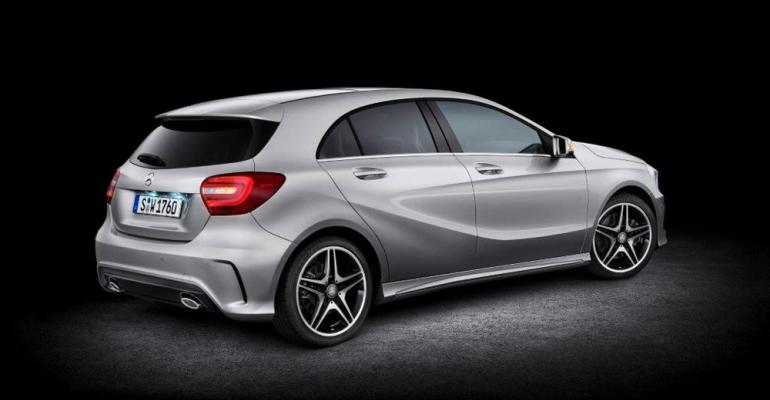LOS ANGELES – Nearly two years after Mercedes-Benz executives told WardsAuto a 4-cyl. turbodiesel was being field-tested for the U.S. market, it appears such an engine will be available within a year.
At the recent New York auto show, Mercedes announced the restyled '13 GLK cross/utility vehicle will be available in early 2013 with a 2.1L turbodiesel rated at 190 hp and 369 lb.-ft. (500 Nm) of torque.
Mercedes says the GLK250 BlueTec 4Matic will be the world's most powerful 4-cyl. diesel utility vehicle.
Gunter Fischer, project manager for the Mercedes SL roadster, tells WardsAuto at a media event here that a small diesel is a good fit for the U.S. as consumers adapt to downsized engines designed to meet strict fuel-economy mandates that require a 35.5 mpg (6.6 L/100 km) fleet average for each auto maker by 2016.
“We brought a 4-cyl. gasoline engine to the U.S. Why shouldn’t we do that with a 4-cyl. diesel? Our competitors do it.” Mercedes’ 1.8L turbocharged gasoline engine is available now in the C-Class.
Audi offers a 2.0L turbodiesel in the A3 liftback and a 3.0L V-6 in the Q7 cross/utility vehicle. Rival BMW has 3.0L 6-cyl. turbodiesels in the 3-Series and X5 CUV and is considering a 4-cyl. diesel for the 3-Series in the U.S. as well. The 6-cyl. diesel won Ward’s 10 Best Engines honors in 2008 and 2009.
General Motors executives have said the new Cadillac ATS, which will compete in the entry luxury segment against the 3-Series, Mercedes C-Class and Audi A4, will have a diesel engine in its first lifecycle.
Volkswagen is leading the way with small diesels in the U.S. with its 2.0L TDI versions of the Jetta, Beetle, Golf and Passat.
In Europe, where about half of new vehicles sell with diesel engines, Mercedes offers several of the fuel sippers, including a 2.2L 4-cyl. in the S-Class flagship, SLK roadster and C-Class and E-Class sedans. In the U.S., the smallest engine available in the S-Class is a 3.0L V-6 BlueTec turbodiesel.
Whether well-heeled Mercedes customers in the U.S. will want 4-cyl. power in an S-Class remains to be seen. In addition to appearing in the GLK, Fischer says a small diesel would provide more than enough torque for American tastes while delivering outstanding fuel economy in the C-Class sedan and perhaps even the SLK roadster and E-Class sedan.
The 2.2L turbodiesel, as well as two other diesels displacing 1.8L and 2.0L, respectively, also will be available in Mercedes’ all-new A-Class compact luxury car, which is anticipated for the U.S. However, a diesel engine has not yet been confirmed for the U.S. application.
“I think when the market demands cars which are more fuel-efficient regarding (carbon-dioxide emissions), then diesel could be a good thing to achieve that because of thermal dynamics,” Fischer says. “It’s more efficient in comparison to gasoline.”
As governments require reductions in tailpipe emissions worldwide, auto makers will be forced to bring modern, clean diesel engines to many markets, including the U.S., he adds.
Fischer is surprised to see on the streets of this city a well-preserved Mercedes SD300 sedan from the late 1970s with a 3.0L turbodiesel. “I never see a car like that running in Germany, and yet I see it here in California,” he says. “I knew it was old because I could see smoke coming from the tailpipe.”
California officials have taken steps in recent years to require drastic improvements in diesel tailpipe emissions and since have become more open to modern clean diesels.
Larger diesel engines require a urea additive to the exhaust stream to help reduce emissions of oxides of nitrogen. But smaller 4-cyl. engines, including VW’s 2.0L in some applications, do not need this expensive technology, also known as selective catalytic reduction.
The 2.1L in the GLK will require SCR in the U.S. application. Fischer seems confident next-generation diesels of all sizes will need the technology. “I think everywhere in the world we will need an SCR system in the future, even in Europe.”





